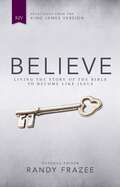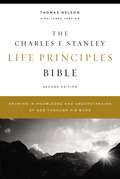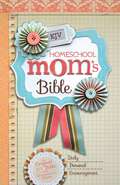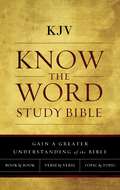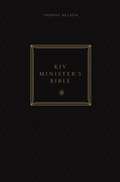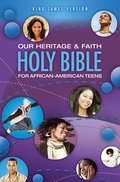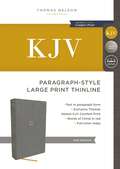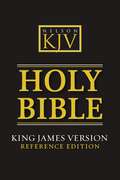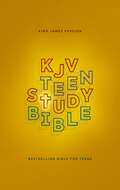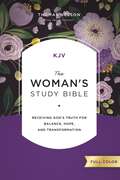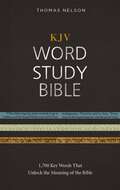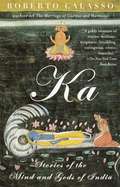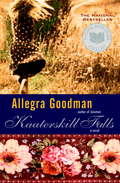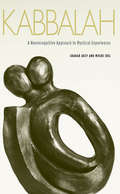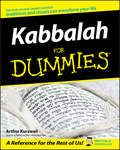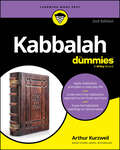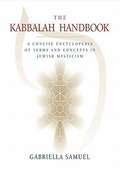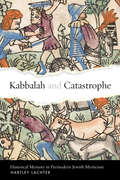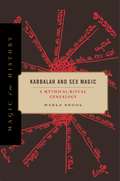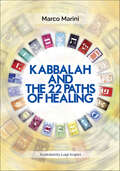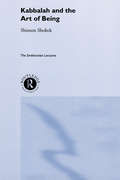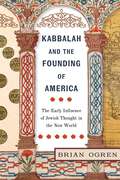- Table View
- List View
KJV, Believe, eBook: Living the Story of the Bible to Become Like Jesus
by ZondervanGrounded in carefully selected Scripture, Believe, KJV is a unique spiritual growth experience that takes you on a journey to think, act, and be more like Jesus. General editor and pastor Randy Frazee walks you through the ten key Beliefs of the Christian faith, the ten key Practices of a Jesus-follower, and the ten key Virtues that characterize someone who is becoming more like Jesus. Every believer needs to ask these three questions: WHAT DO I BELIEVE? WHAT SHOULD I DO? WHO AM I BECOMING? Each chapter uses short topical passages from the classic King James Version to help you live the story of the Bible. As you journey through this book, whether in a group or on your own, one simple truth will become undeniably clear: what you believe drives everything. Using this edition of Believe, church families around the globe can now embrace a full ministry year through worship services, small group studies, and family activities. Learn more about this church-wide experience at BelieveTheStory.com.
KJV, Charles F. Stanley Life Principles Bible, 2nd Edition, eBook: Growing in Knowledge and Understanding of God Through His Word
by Thomas NelsonThe Charles F. Stanley Life Principles Bible is designed to lead believers into a life-changing relationship with Jesus Christ, and to help them experience the Good News about God&’s mighty kindness and love. Built around 30 Life Principles Dr. Stanley has gleaned from Scripture during his fifty years of teaching and pastoral ministry, this Bible is sure to encourage and strengthen believers as they seek to lead faithful, joyful lives that please God.With over one million Life Principles Bibles sold to date, the updated second edition is the best way to experience this bestselling classic—with a completely new design featuring Thomas Nelson&’s KJV easy-to-read Comfort Print® typeface, 100 specially designed maps and charts that bring biblical places and themes to life, and over 43,000 cross references to enrich your study of the Word.Features include:30 Life Principles articles highlight Dr. Stanley&’s essentials for Christian livingMore than 2,500 Life Lessons verse notes bring to life the practical and personal nature of God&’s Word to usLife Examples articles draw powerful lessons from the lives of people throughout ScriptureOver 300 highlighted verses make it easy to find God&’s promises throughout the Bible text that encourage, strengthen, and bring hopeAnswers to Life's Questions and What the Bible Says About articles bring scriptural insight to bear on topics of special importance to every believerTopical indexes give immediate access to hundreds of life-giving principles and promises throughout the Old and New TestamentsBook introductions provide an overview of the themes and literary structure of each book, and alert readers to important principles they&’ll encounter as they readNew for the 2nd Edition, 100 maps and charts that help important biblical places and themes come alive, and over 43,000 cross references to enrich your studyConcordance
KJV, Homeschool Mom's Bible
by ZondervanHeartfelt Inspiration to Revive, Encourage, and Strengthen the Homeschooling MomIf you&’re on an airplane, you&’re instructed, in the event of a loss of cabin pressure, to put on your own oxygen mask before helping your child. The reason? If you don&’t have a supply of oxygen, you won&’t be able to help anyone else.The same is true for the rest of life: you can&’t give what you don&’t have. And as a homeschooling mom, you pour yourself out every day for the sake of your children. Yet how do you fill yourself up? Where do you get your spiritual oxygen?Now you can be filled and restored by the original Bible for homeschool moms—with a full year&’s worth of encouraging daily devotions placed alongside the beloved text of the King James Bible. These heartfelt, practical readings written by Janet Tatman, a former homeschooling mom, cover topics such as finding strength to keep motivated, avoiding burnout, staying focused and committed, navigating the needs of toddlers while educating siblings, managing schedules, delegating tasks and chores, setting boundaries, and most importantly, maintaining proper soul care while juggling educational and household responsibilities.The words of these devotions will breathe life into your soul so that you can successfully run the race. Features:• 365 daily meditations with prayers written by Janet Tatman, a veteran homeschooling mother with more than 25 years of experience homeschooling • The full text of the classic King James Version (KJV) Bible • Foreword from Vickie Farris, author, homeschool mom, and wife of Michael Farris, founder of the Homeschool Legal Defense Association• Topical index
KJV, Know The Word Study Bible, Ebook, Red Letter Edition: Gain a greater understanding of the Bible book by book, verse by verse, or topic by topic
by Thomas NelsonThe KJV Know the Word Study Bible offers three easy ways to begin studying Scripture and helps individuals transition from being a casual reader of the Bible to becoming a regular student of the Bible. You can choose to study the Bible book-by-book, verse-by-verse, or topic-by-topic; each path offers powerful insights that will help you develop a daily routine of Bible study. The book-by-book series of notes leads you through the main points of each book of the Bible. The verse-by-verse notes help you to dig deeper into God’s Word. The topic-by-topic articles, which cover 21 theological topics, guide you through a series of insightful notes and give you a thorough biblical understanding of each topic. With the beautiful and timeless text of the KJV translation, the KJV Know the Word Study Bible offers you choices of how to study Scripture and grow in your relationship with Christ.Features Include: • King James Version Bible text• Three easy approaches to study the Bible: 1. Book by Book; 2. Verse by Verse; 3. Topic by Topic• Insightful introductions for each book of Scripture• Words of Jesus in red• Beautiful two-color interior page design• Comprehensive list of theological notes• Concordance• Full-color maps
KJV, Minister's Bible, Ebook
by Thomas NelsonPastors and church leaders stand ready to meet the needs of their flocks. And Thomas Nelson's beautiful and durable KJV Minister’s Bible is here to help. With sermons, readings, outlines, prayers, and more, this Bible is a one-stop resource, offering direction for weddings, funerals, communion and baptism services, confirmations, dedications, and a variety of other pastoral care situations.Features include:Complete text of the timeless King James Version, perfect for all devotional and worship settingsA comprehensive collection of pastoral resources, located between the Testaments--prayers, sermons, outlines, and more
KJV, Our Heritage and Faith Holy Bible for African-American Teens, eBook
by Cheryl And HudsonFinding a way to interest and engage teens in God’s Word has always been a challenge. Our Heritage and Faith Holy Bible for African-American Teens is the perfect resource to help teens learn more about their faith in a relevant context. It focuses on the questions that teens have about their personal faith, their heritage, and traditions of worship. This relevant Bible provides teens with answers that help them understand their African-American Christian roots while learning more about God’s Word. Teens will treasure this Bible as they come to know the roots of their lives, their forms of worship, and their faith in God. Features Include: Complete text of the King James Version, the timeless, beloved Bible translation Introductions to each book of the Bible 16 full-color tip-in pages with photographs and captions Words of Christ in red Innovative Italian Duo-Tone designs customized for guys and girls Presentation pages for gift giving
KJV, Paragraph-style Large Print Thinline Bible
by Thomas NelsonThe KJV Paragraph-style Large Print Thinline Bible features the timeless beauty of the trustworthy King James Version Bible. While the traditional design of the King James text starts each verse on its own line, this edition improves the reading experience and comprehension by keeping the writers&’ thoughts together in paragraph format. And with Thomas Nelson&’s exclusive KJV Comfort Print®, you&’ll enjoy typography designed to be exceptionally easy-to-read and honoring the legacy of the King James Version.In 1611 the King James Bible was published and authorized by the monarch of England and Scotland. Today, more than 400 years since its initial publication, the KJV is considered one of the most influential and beautiful works of the English language and continues to be the favorite translation for millions of Christians worldwide.Features include:Clear and readable 10-point KJV Comfort PrintLine-matched double column textBible book introductionsWords of Christ in redOver 22,000 translator notesOver 43,000 cross-referenced passagesConcordanceOne-year Bible Reading PlanThe Parables of Jesus Christ chartThe Miracles of Jesus Christ chart
KJV, Reference Bible, eBook
by Thomas NelsonThis classic King James Version UltraSlim Reference Bible has a wealth of study helps.á Over 60,000 center-column references guide you to related verses for further study and understanding of the Bible, and a concordance enables you to locate key verses and concepts.á Book introductions, explanatory notes, and full-color maps furnish background information to enhance understanding of the Scriptures.á This Bible is a beautifully packaged resource for comfort, wisdom, and inspiration.
KJV, Teen Study Bible
by ZondervanThe bestselling KJV Teen Study Bible helps teens apply God&’s Word to the issues they face every day!Full of study features to help today's teen learn more about God, the Bible, and how God's Word relates to their lives, the KJV Teen Study Bible will help them keep in step with all God has done, is doing, and will do in the world. Teens will discover the eternal truths of God's Word and how to apply them to the issues they face every day as they read biblical advice about dealing with everything from friends, family, and school to problems such as bullying and depression. As teens navigate their hectic and sometimes stressful lives, this study Bible will help them to deepen and understand their faith while reassuring them that God is always with them, and they are never alone.Features:Complete text of the King James Version (KJV)&“We Believe&” features unpack the Apostles&’ Creed to reveal the biblical foundation of faith&“Panorama&” features keep the big picture of each book of the Bible in viewTopical indexes help with in-depth Bible studyBook introductions provide an overview for each book of the BibleBiblical advice about friends, family, school, and other issuesImportant Bible verses to memorizeQ and As test your Bible knowledgeProfiles of people in the BibleTwo-color page design8-page full-color map section
KJV, The Woman's Study Bible, Full-Color, Comfort Print: Receiving God's Truth for Balance, Hope, and Transformation
by Thomas NelsonA study Bible with thousands of verse commentary notes designed by women specifically for women to receive God&’s truth for balance, hope, and transformation.The Woman&’s Study Bible poignantly reveals the Word of God to women, inviting them to receive God&’s truth for balance, hope, and transformation. Special features designed to speak to a woman&’s heart appear throughout the Bible text, revealing Scripture-based insights about how godly womanhood grows from a woman&’s identity as a Christ-follower and a child of the kingdom.Now with a beautiful full-color redesign, The Woman&’s Study Bible reflects the contributions of over 80 women from a wide variety of ethnic, denominational, educational, and occupational backgrounds. Since the publication of the first edition of The Woman&’s Study Bible, this landmark study Bible has sold over 2 million copies. Features include: Beautiful full-color design throughout for you to enjoy as you engage ScriptureDetailed biographical portraits allow you to learn from the lives of over 100 women in the BibleThousands of extensive verse-by-verse study notes explain each passage and provide meaning to ScriptureOver 300 in-text topical articles on relevant issues for you to glean wisdom from and apply to your lifeInsightful essays by women who are recognized experts in the fields of theology, biblical studies, archaeology, and philosophy to deepen your theological knowledgeBook introductions and outlines provide an overview and context for each bookHundreds of full-color, in-text maps, charts, timelines, and family trees give a visual representation of Israel and other biblical themesQuotes from godly women throughout history to encourage and guide your faith journeyTopical index and concordance help locate words and show the number of occurrences throughout the BibleClear and readable KJV Comfort Print® typeface in 10.5-point print size
KJV, Word Study Bible, Ebook, Red Letter Edition: 1,700 Key Words that Unlock the Meaning of the Bible
by Thomas NelsonThe KJV Word Study Bible provides 1,700 easy-to-use word studies, in-text subheadings, select Hebrew, Aramaic and Greek words explained from Genesis to Revelation helping you dig deeper into your Bible study. By relying on these ancient texts we are able to read scripture as it was originally written and passed on from generation to generation, bringing these words to life allowing you to almost hear Jesus teaching on the hillside or crying out to God on the cross. As you study you will discover the richness and significance of the original languages of the Word of God and experience scripture in a whole new way. Features Include: • Book introductions • Words of Christ in red • Word studies • Indexes • Concordance
Ka: Stories of the Mind and Gods of India (Vintage International)
by Roberto CalassoIn "the very best book about Hindu mythology that anyone has ever written" (The New Republic) Calasso plunges Western readers into the mind of ancient India. He begins with a mystery: Why is the most important god in the Rg Veda, the oldest of India's sacred texts, known by a secret name—"Ka," or Who?What ensues is not an explanation, but an unveiling. Here are the stories of the creation of mind and matter; of the origin of Death, of the first sexual union and the first parricide. We learn why Siva must carry his father's skull, why snakes have forked tongues, and why, as part of a certain sacrifice, the king's wife must copulate with a dead horse. A tour de force of scholarship and seduction, Ka is irresistible.
Kaaterskill Falls
by Allegra GoodmanIn the summer of '76, the Shulmans and the Melishes migrate to Kaaterskill, the tiny town in upstate New York where Orthodox Jews and Yankee year-rounders live side by side from June through August. Elizabeth Shulman, a devout follower of Rav Elijah Kirshner and the mother of five daughters, is restless. She needs a project of her own, outside her family and her cloistered community. Across the street, Andras Melish is drawn to Kaaterskill by his adoring older sisters, bound to him by their loss and wrenching escape from the Holocaust. Both comforted and crippled by his sisters' love, Andras cannot overcome the ambivalence he feels toward his children and his own beautiful wife. At the top of the hill, Rav Kirshner is coming to the end of his life, and he struggles to decide which of his sons should succeed him: the pious but stolid Isaiah, or the brilliant but worldly Jeremy. Behind the scenes, alarmed as his beloved Kaaterskill is overdeveloped by Michael King, the local real estate broker, Judge Miles Taylor keeps an old secret in check, biding his time....From the Trade Paperback edition.
Kabbalah
by Moshe Idel Shahar ArzyIn this book, the world’s foremost scholar of Kabbalah explores the understanding of erotic love in Jewish mystical thought. Encompassing Jewish mystical literatures from those of late antiquity to works of Polish Hasidism, Moshe Idel highlights the diversity of Kabbalistic views on eros and distinguishes between the major forms of eroticism. The author traces the main developments of a religious formula that reflects the union between a masculine divine attribute and a feminine divine attribute, and he asks why such an "erotic formula” was incorporated into the Jewish prayer book. Idel shows how Kabbalistic literature was influenced not only by rabbinic literature but also by Greek thought that helped introduce a wider understanding of eros. Addressing topics ranging from cosmic eros and androgyneity to the affinity between C. J. Jung and Kabbalah to feminist thought, Idel’s deeply learned study will be of consuming interest to scholars of religion, Judaism, and feminism.
Kabbalah For Dummies
by Arthur KurzweilKabbalah For Dummies presents a balanced perspective of Kabbalah as an “umbrella” for a complex assemblage of mystical Jewish teachings and codification techniques. Kabbalah For Dummies also shows how Kabbalah simultaneously presents an approach to the study of text, the performance of ritual and the experience of worship, as well as how the reader can apply its teaching to everyday life.
Kabbalah For Dummies
by Arthur KurzweilA trustworthy, easy-to-read guide to an integral part of Judaism Kabbalah For Dummies, 2nd Edition is your factual and objective guide to understanding Kabbalah—a spiritual practice, also known as the “received tradition,” that's connected to Judaism. This easy-to-follow resource walks you through how to connect to and better understand the Kabbalistic way of life, through explaining what Kabbalah is and isn't and detailing the Kabbalistic approach to the Torah, the Talmud, the Mishnah, and more Jewish texts. You'll also discover how to practice common rituals, worship, and pray as a practitioner of Kabbalah with this informative resource. Understand the foundations of Kabbalah (including core ideas) Know what Kabbalistic practice and study entails Discover key Kabbalah resources Perfect for practicing Kabbalists who want to brush up on the basics and for the Kabbalah-curious—Kabbalah For Dummies, 2nd Edition is a must-read resource for anyone who wants to understand the fundamentals of one of the world's great spiritual practices.
Kabbalah Handbook
by Gabriella SamuelA comprehensive single-volume reference guide to the terms and ideas of Kabbalah by a longtime teacher of Jewish mysticism -perfect for the serious student and newcomer alike. People of all faiths and backgrounds are drawn to the inspiration, knowledge, and spiritual insight that Kabbalah offers. But too often writings on Jewish mysticism are impenetrable for the novice, overly simplified for the advanced student, or misrepresent and sensationalize Kabbalistic practice. The Kabbalah Handbook is the first comprehensive single-volume Kabbalah reference guide that is indispensable for Kabbalah students of every level. The Kabbalah Handbook features: - more than five hundred key terms and concepts in straightforward, easy-to-read definitions and thorough, well-researched discussions; - Hebrew, English, and Hebrew transliteration for each item; - the language of origin for each term; - a discussion of all sides of differing opinions within Kabbalistic philosophy; - pronunciation guides; - nondiscriminatory, gender-neutral language; - important historical information; - extensive cross-referencing that enables readers to find all terms, whether they are looking up a word in English or transliterated Hebrew; - twenty-eight original and innovative illustrations; - thirty-two tables and charts that organize and break down unwieldy material into manageable items; and - appendices covering topics such as the 613 Mitzvot (biblical commandments), the lunar calendar, and the sacred names of God.
Kabbalah and Catastrophe: Historical Memory in Premodern Jewish Mysticism (Stanford Studies in Jewish Mysticism)
by Hartley LachterWhile premodern kabbalistic texts were not chronicles of historical events, they provided elaborate models for understanding the secret divine plan guiding human affairs. Hartley Lachter analyzes innovative kabbalistic doctrines, such as the idea of reincarnation and the notion of multiple successive universes, through which Jewish mystics sought to demonstrate that the misfortunes of Jewish history were in fact necessary steps toward redemption. Lachter argues that these works, mostly composed between the early 14th century and the generation affected by the Spanish expulsion in the early 16th century, enabled Jewish readers to make sense of the troubling misfortunes of their own time. Kabbalah and Catastrophe uncovers the remarkable variety of ways that kabbalists deployed esoteric tradition to argue that God had not abandoned the Jews to the inscrutable forces of history. Instead, they suggested to readers that Jews are history's primary actors, and that despite their small numbers and lack of military power, Jews nonetheless secretly push history forward. For scholars of Jewish mysticism and medieval Jewish history, Lachter articulates how premodern mystical texts can be crucial sources of insight into how Jews understood the meaning of history.
Kabbalah and Consciousness
by Allen AftermanAn interesting modern interpretation of the Kabbalah and is very clear and concise.
Kabbalah and Ecology
by David Mevorach SeidenbergKabbalah and Ecology is a groundbreaking book that resets the conversation about ecology and the Abrahamic traditions. David Mevorach Seidenberg challenges the anthropocentric reading of the Torah, showing that a radically different orientation to the more-than-human world of nature is not only possible, but that such an orientation also leads to a more accurate interpretation of scripture, rabbinic texts, Maimonides and Kabbalah. Deeply grounded in traditional texts and fluent with the physical sciences, this book proposes not only a new understanding of God's image but also a new direction for restoring religion to its senses and to a more alive relationship with the more-than-human, both with nature and with divinity.
Kabbalah and Sex Magic: A Mythical-Ritual Genealogy (Magic in History #23)
by Marla SegolIn this provocative book, Marla Segol explores the development of the kabbalistic cosmology underlying Western sex magic. Drawing extensively on Jewish myth and ritual, Segol tells the powerful story of the relationship between the divine and the human body in late antique Jewish esotericism, in medieval kabbalah, and in New Age ritual practice.Kabbalah and Sex Magic traces the evolution of a Hebrew microcosm that models the powerful interaction of human and divine bodies at the heart of both kabbalah and some forms of Western sex magic. Focusing on Jewish esoteric and medical sources from the fifth to the twelfth century from Byzantium, Persia, Iberia, and southern France, Segol argues that in its fully developed medieval form, kabbalah operated by ritualizing a mythos of divine creation by means of sexual reproduction. She situates in cultural and historical context the emergence of Jewish cosmological models for conceptualizing both human and divine bodies and the interactions between them, arguing that all these sources position the body and its senses as the locus of culture and the means of reproducing it. Segol explores the rituals acting on these models, attending especially to their inherent erotic power, and ties these to contemporary Western sex magic, showing that such rituals have a continuing life. Asking questions about its cosmology, myths, and rituals, Segol poses even larger questions about the history of kabbalah, the changing conceptions of the human relation to the divine, and even the nature of religious innovation itself. This groundbreaking book will appeal to students and scholars of Jewish studies, religion, sexuality, and magic.
Kabbalah and Sex Magic: A Mythical-Ritual Genealogy (Magic in History)
by Marla SegolIn this provocative book, Marla Segol explores the development of the kabbalistic cosmology underlying Western sex magic. Drawing extensively on Jewish myth and ritual, Segol tells the powerful story of the relationship between the divine and the human body in late antique Jewish esotericism, in medieval kabbalah, and in New Age ritual practice.Kabbalah and Sex Magic traces the evolution of a Hebrew microcosm that models the powerful interaction of human and divine bodies at the heart of both kabbalah and some forms of Western sex magic. Focusing on Jewish esoteric and medical sources from the fifth to the twelfth century from Byzantium, Persia, Iberia, and southern France, Segol argues that in its fully developed medieval form, kabbalah operated by ritualizing a mythos of divine creation by means of sexual reproduction. She situates in cultural and historical context the emergence of Jewish cosmological models for conceptualizing both human and divine bodies and the interactions between them, arguing that all these sources position the body and its senses as the locus of culture and the means of reproducing it. Segol explores the rituals acting on these models, attending especially to their inherent erotic power, and ties these to contemporary Western sex magic, showing that such rituals have a continuing life. Asking questions about its cosmology, myths, and rituals, Segol poses even larger questions about the history of kabbalah, the changing conceptions of the human relation to the divine, and even the nature of religious innovation itself. This groundbreaking book will appeal to students and scholars of Jewish studies, religion, sexuality, and magic.
Kabbalah and the 22 Paths of Healing
by Marco Marini33 Hebrew letter cards, comprehensive healing guide, and therapeutic CD for 22 paths in Kabbalistic traditionIncludes Tree of Life, Hebrew letters and meanings, related body functions and parts, benefits, and adviceTarot connections are explored
Kabbalah and the Art of Being: The Smithsonian Lectures
by Shimon ShokekThis new approach introduces Kabbalah as a spiritual Jewish way of living, a practical wisdom for living, creativity and well being, and not merely a religious phenomenon or esoteric theology. Professor Shokek suggests that the Kabbalistic theme of Creation is the central ingredient in the spiritual teachings of Jewish mysticism. He skilfully reveals the core questions that emerge from the wisdom of the Jewish sages, opening up a lively avenue of debate in this increasingly popular area of study.
Kabbalah and the Founding of America: The Early Influence of Jewish Thought in the New World
by Brian OgrenExplores the influence of Kabbalah in shaping America’s religious identityIn 1688, a leading Quaker thinker and activist in what is now New Jersey penned a letter to one of his closest disciples concerning Kabbalah, or what he called the mystical theology of the Jews. Around that same time, one of the leading Puritan ministers developed a messianic theology based in part on the mystical conversion of the Jews. This led to the actual conversion of a Jew in Boston a few decades later, an event that directly produced the first kabbalistic book conceived of and published in America. That book was read by an eventual president of Yale College, who went on to engage in a deep study of Kabbalah that would prod him to involve the likes of Benjamin Franklin, and to give a public oration at Yale in 1781 calling for an infusion of Kabbalah and Jewish thought into the Protestant colleges of America.Kabbalah and the Founding of America traces the influence of Kabbalah on early Christian Americans. It offers a new picture of Jewish-Christian intellectual exchange in pre-Revolutionary America, and illuminates how Kabbalah helped to shape early American religious sensibilities. The volume demonstrates that key figures, including the well-known Puritan ministers Cotton Mather and Increase Mather and Yale University President Ezra Stiles, developed theological ideas that were deeply influenced by Kabbalah. Some of them set out to create a more universal Kabbalah, developing their ideas during a crucial time of national myth building, laying down precedents for developing notions of American exceptionalism. This book illustrates how, through fascinating and often surprising events, this unlikely inter-religious influence helped shape the United States and American identity.
